

I am just a girl who can’t say “no.” In my youth this was actually a fun quality, but now it means that I spend a lot of time manning concession booths, volunteering in Sunday school classrooms, and doing whatever else the local Uber Mom has tasked me with. But make no mistake, I am not the Uber Mom. The Uber Mom is the mom who is always in charge. She knows everyone, runs every volunteer effort, and cooks absolutely everything from scratch.
One thing I have noticed about these moms, whose astounding accomplishments are both impressive and deeply annoying (homemade marshmallows? really?), is that they are not dispersed evenly through society. This became particularly apparent to me when my own children moved from a private and rather expensive pre-school to a public school in LAUSD. Overnight we went (as my husband likes to point out) from being young,


(Editor’s Note: This post first appeared May 3 on Huffington Post.)
Today is Pete Seeger’s 93rd birthday.
What’s an appropriate gift for the most influential folk artist of the 20th century? A few years ago some of Pete’s fans launched a campaign to nominate him for the Nobel Peace Prize. It is time to resurrect that effort.
No one can get a crowd singing like he can. The songs he has written, including the antiwar tunes “Where Have All the Flowers Gone?,” “If I Had a Hammer,” and “Turn, Turn, Turn” (whose text is drawn from Ecclesiastes), and those he has popularized, including “This Land Is Your Land,” “Guantanamera,” “Wimoweh,” and “We Shall Overcome,” have been recorded by hundreds of artists in many languages and have become global anthems for people fighting for freedom. His songs are sung by people in cities and villages around the world,


Memory is not only highly selective, but fatefully idiosyncratic. We remember – or forget – based on where we were, who we were with and, more elementally, who we are.
In April 1992, I was a 28-year-old editor of a now long-defunct weekly, the Village View. When violence erupted following the unfathomable not-guilty verdicts in the Rodney King beating trial, I was where I usually was in those days – knee deep in the grind of getting a paper to press. I wish I could recall exactly what I was doing, or who I was with, but those details are lost to history.
What I do know is that, because of who I was – the news editor of an alternative paper with few of the traditional restrictions that most journalists live with – my reaction to, and experience of, the civil unrest were defined not only by the fear and dread shared by many Angelenos,
» Read more about: 1992 Remembered: Memory, Truth and Justice »


What I mostly remember about the riots is the smell of an urban fire – not the consoling, woody scent that wafts from a campfire, but the melting-telephone smell of a city’s guts ablaze. There was also the smoke, thick as tule fog – and the not-knowing, when you drove into it, if you’d come out on the other side.
There was something else about that week – a feeling that the world had been jolted a bit off its axis and nothing would ever be the same again, the way you feel after a breakup or car accident. The worst of it came on April 30. I had gone to a film screening in Santa Monica, and took my friend Kent to cheer him up from losing his job repairing pay phones. I was reviewing the movie for the L.A. Weekly, where I worked as an editor.


Wikimedia
If absence makes the heart grow fonder, distance makes reality look rosier. From a long way off Santa Monica appears like a liberal’s fantasy of justice in paradise. After all, we have a tough rent control law and we’ve had a mostly enlightened city council, government and school board for more than three decades. But from up close, the picture’s not that sweet.
A recent hotel approval exposed the reality. A developer wanted some special consideration for the 710 Wilshire hotel project that was oversized and out of conformance with zoning standards. Hotel workers in the city wanted to guarantee a decent wage for the people who would work in the new hotel as well as those who would build it. The city staff likes hotels because they provide an easy source of revenue. But the developer wouldn’t budge on the wage issues.
He wasn’t willing to require an operator to pay a decent income to hard-working,
» Read more about: Santa Monica Dreaming: Trouble in Rent-Controlled Paradise »
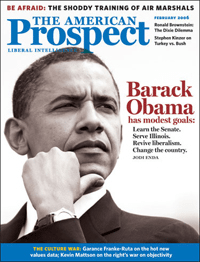
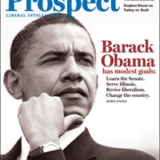






Ruben Martinez is a professor of literature and writing at Loyola Marymount University; his most recent book, Desert America: Boom and Bust in the New Old West, will be released in August. At the time of 1992’s civil unrest, he was a reporter for the L.A. Weekly. Martinez spoke to Frying Pan News about his coverage during that volatile week.
Frying Pan News: What was your assignment that first day?
Ruben Martinez: I was at the courthouse in Simi Valley, camped out with Eric Spillman of KTLA – I couldn’t get inside, there were too many people there already. Outside, all the veteran journalists had their lawn chairs and umbrellas — they’d been there for weeks. The spectacle of it impressed me.
Did the acquittals shock the media?
Yes. A really motley crew of people – reporters,
» Read more about: 1992 Remembered: Prophets and Prisoners of War »
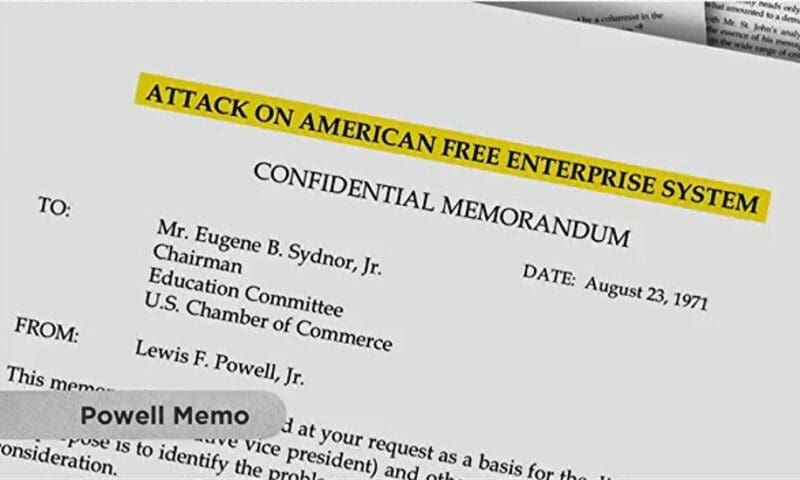
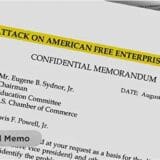
Heist, a new film by Frances Causey and Donald Goldmacher, joins the growing list of angry documentaries chronicling the destruction of America’s economy and its middle class by powerful corporate forces. Like Inside Job and just about any title in the Brave New Films catalog, Heist gets our blood boiling with its money-pile graphics and occasional glib comments exhaled by Wall Street fat cats. Call this genre the Cinema of Outrage.
Subtitled Who Stole the American Dream?, the film breaks away from the pack, however, by drilling deep to explain how we came to find ourselves on the verge of where Argentina was a dozen years ago. The film also eschews conspiracist viewpoints and refuses to offer up, say, Alan Greenspan or the Koch brothers as villainous piñatas for us to vicariously bash.
Instead, Causey and Goldmacher soberly state their case that a concerted,
» Read more about: "Heist" Chronicles Theft of American Dream »
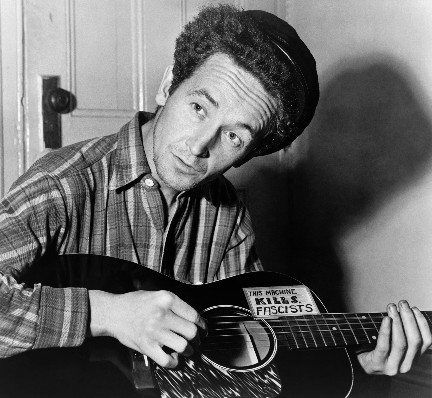
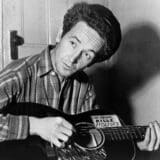
Woody Guthrie — who wrote more than 3,000 songs and is best known for “This Land Is Your Land,” often considered America’s alternative national anthem — had his first big break and taste of success while living in Los Angeles from 1937 to 1940. His experiences in South California during the Depression inspired his radical views about social and political conditions. He wrote songs about families facing foreclosure by unscrupulous banks, migrant Mexican farm workers exploited by agribusiness, and politicians who turned a blind eye to the widespread suffering — topics that unfortunately still resonate today. He also penned patriotic songs about America’s promise and its natural beauty, and angry songs encouraging Americans to organize unions and protest against injustice.
On Saturday, Los Angeles will celebrate Guthrie’s life and legacy, part of a nationwide year-long series of conferences, concerts, and museum exhibits sponsored by the Los Angeles-based Grammy Museum and the New York-based Woody Guthrie Archives.


Last year I wrote a one-man play that I perform called To Begin the World Over Again: The Life of Thomas Paine. It’s about the one truly radical Founding Father whose greatest vision was for genuine equality. Paine called for an end to slavery, as well as for all men to vote, and suggested equal rights for women – all outrageous propositions for his time. Yet in the process of writing my play I discovered just how politically isolated we are from one another today. My Google Alerts for Paine have enlightened me as to many Web sites, events and points of view — particularly the YouTube videos of one Bob Basso. Until recently I had never heard of Mr. Basso. Neither had any of my friends or audience members from my show.
Basso has an interesting resume, however. He is a former flamboyant television show host in Hawai’i,

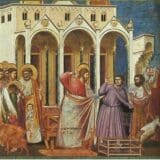
Walking back from the SEIU-SOULA* demonstration for immigrant rights at the downtown Federal Courthouse, I am wearing my clerical collar and carrying a CLUE-LA picket sign slung over my shoulder. Just across the 110 Freeway on Sixth Street, an older, tall, rather dapper looking white man passed me. Then about 10 paces on, he turns and asks: “What club are you with?”
“Clergy and Laity United for Economic Justice,” I say.
To which he he asks, “Isn’t there justice in this country?”
“If you’re part of the one percent,” I answer.
“Well, I am part of the one percent,” he says, “And I am not giving any of it to you!” Then he strode on at an increased gait.
“Give” I thought. Who said anything about “giving”? Apparently, he does not believe in giving one’s self to another for their nurture and for one’s own.
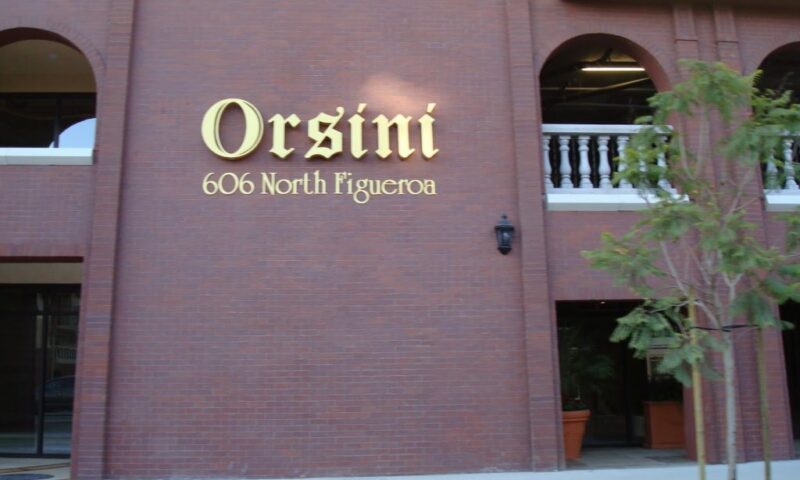

Every time I drive down Sunset Boulevard toward Chinatown, I get really mad. And it’s not only because Walmart wants to move into this neighborhood without extending the most basic community outreach. It’s because of those monstrous, faux-Italian Renaissance apartment buildings that take up blocks of space on what should be Chinatown’s Gateway. Those ugly looking bunkers house hundreds of market-rate apartment dwellers and are called Orsini I, II and III. They are owned by developer Geoffrey Palmer, and the story of how they were allowed to be built is a familiar one in Los Angeles.
A wealthy developer bought some land and wanted to build what he wanted to build. City officials were bullied into believing that there was nothing they could do about it. When Palmer managed to illegally bulldoze Bunker Hill’s last remaining Victorian cottage, the city sued. Palmer counter-sued. The city settled for a compromise where the developer promised to create a project that involved the community,

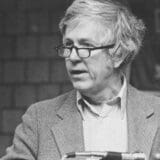
Fifty years ago this month Michael Harrington wrote a book, The Other America: Poverty in the United States – a haunting tour of deprivation in an affluent society – that inspired Presidents John Kennedy and Lyndon Johnson to wage a war on poverty. This slim, 186-page volume became a best-seller and became required reading for social scientists, elected officials, college students, members of study groups sponsored by churches and synagogues, reporters and intellectuals, the new wave of community organizers and the student activists who traveled to the South to join the civil rights crusade. Harrington was soon in great demand as a speaker on college campuses, union halls and religious congregations. Reporters and television talk-show hosts wanted to interview him.
Harrington wrote that the poor were invisible to most Americans because they lived in rural isolation or in urban slums. Once they become aware of the situation, Americans should be ashamed to live in a rich society with so many poor people.
» Read more about: Michael Harrington's Other America: 50 Years Later »


Here’s a story you may not be hearing about anytime soon on KPFK — Pacifica, the nonprofit foundation that runs 90.7 FM in L.A., as well as four other progressive radio stations around the country, has retained a high-powered labor-bashing firm. Jackson Lewis LLC, described by the AFL-CIO as “America’s number one union-buster,” is on the Pacifica payroll. “All we do is work,” its site announces – right next to its “Union Free” portal.
Those with long memories of past internecine battles at Pacifica will hardly be surprised to hear about the latest turn of events. This, of course, makes it no less depressing. At a time when right-wing forces are waging war against the rights of American workers to be represented by a union, now is certainly not the time for Pacifica to side with labor’s antagonists.
» Read more about: WebHot! Surprise (Not): Union Busting at Pacifica Radio »
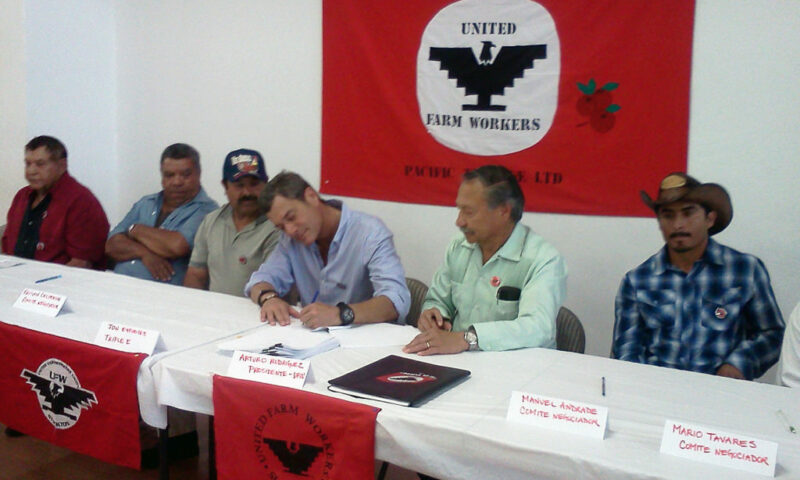
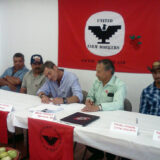
Anyone involved in the United Farm Workers campaigns of the 1960s and ’70s will tell you how critical those efforts were – not only to the well-being of farmworkers, but to the participant’s identity and the development of his or her views on labor and the world.
Many activists, like myself, were not vineyard or orchid pickers, but merely college students who helped organize local boycotts and picket lines far from the state’s embattled valleys. Yet even we sometimes glimpsed first-hand the epic human struggles that were transforming California’s agriculture, as I did during a brief summer stint in the 1973 grape strike outside Fresno.
To this day sense impressions remain vivid: The stifling 104-degree heat of the picket lines; the revivifying cold of the Kings River at night; the sweet sound of Superior Court Judge Peckinpah (Wild Bunch director Sam’s brother) ordering the release of thousands of farm workers from jail after they’d been arrested for protesting;
» Read more about: A People’s History of the Farmworkers Movement »


By Johnny 5 Hanrahan
I, along with 30 other talented, hardworking crew members, was fired recently from a successful, internationally popular TV show called 1000 Ways to Die. Our crime: Trying to unionize. Joining the union would allow us to have health insurance — something that is not asking for too much, especially from a hit show. It is easy to take advantage of a reality TV crew in this economy, especially for low-ball rates, by having members work 70-plus hour weeks on their feet, as they make nearly minimum wage in a non-union atmosphere. We wanted the opportunity to live the better, healthier lives which we deserve; hence we contacted unions to help us with that. “Together we are what we cannot be alone. United we stand, divided we fall.”
Reps from the Teamsters and IATSE (International Alliance of Theatrical Stage Employees) came to the set on our behalf —
» Read more about: Reality TV Bites: “Blue Collar” Show Fires Its Workers »


Most of us – at least the 87 percent or so of us not protected by collective bargaining agreements – have to worry about job security. With only a few exceptions, all of us can be fired for any reason – or for no reason at all.
Two California news “scandals” brought this into sharp relief this week, as a couple of public employees found themselves under fire for some extracurricular activities.
In one case, Daniel Richards, president of the state Fish and Game Commission, shot and killed a mountain lion during a hunting trip in Idaho. In another case, some students discovered that Oxnard middle school teacher Stacie Halas had shot a porn video. Both are facing some degree of popular outrage, and calls for their dismissals.
First things first: No one has yet alleged that either of these two has violated any laws.
» Read more about: Hunting and Porn: Job Security in California »